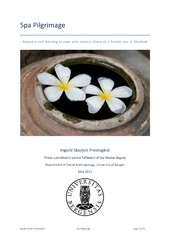Spa Pilgrimage
Master thesis
Permanent lenke
https://hdl.handle.net/1956/6848Utgivelsesdato
2013-05-25Metadata
Vis full innførselSamlinger
Sammendrag
This Master project is about different understandings of health and illness. Fieldwork was conducted at a holistic spa in Thailand, where the spa clientele was primarily women from Western countries. Several of the women had chronic illnesses or other experiences with trauma or illness. The selection of women I have worked with saw health as the most important thing, and found ways of making illness less important in their lives. They achieved this by focusing on what they were able to do rather than what they were unable to do. These women exercise a high degree of both agency and resistance towards illness, and see their own proactivity as central to their wellbeing. I also look at how the concepts recovery and learning to cope feel, and use a phenomenological approach along with myth-theory for a deeper analysis. A central point is around liminality, and how their different liminal states are dealt with, accepted and valued. The process of recovery takes the person through liminal states at the same time as they who learn to live with chronic conditions in many ways remain permanently in the liminal state. One way of describing this is through pilgrimage, both as a metaphor, coping mechanism and a concept to think with. Through the help of a conceptual cultural framework encompassing spirituality, dealing with the unknown and the search for change and absorption in a process, these women discover meaning that perhaps is a little beyond the ordinary. I look at values, criticise theories around consumption because they ignore agency and self-identified meaning, and discuss questions around power of definition. It is interesting that these women are Western, yet create their own culture that differs from commonly held thoughts around how to relate to health and illness. I draw inspiration from anthropologists such as Bruce Kapferer, Jill Dubisch, Deana Weibel, Carol Laderman and Laura Ahern, as well as theoreticians from other areas such as CG Jung, Edward Tick og Jean Shinoda Bolen.
